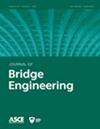gfrp -钢筋混凝土空心圆桥柱荷载-弯矩相互作用图的试验与理论发展
IF 3.1
2区 工程技术
Q2 ENGINEERING, CIVIL
引用次数: 0
摘要
空心混凝土柱(HCCs)作为桥墩和桩在桥梁应用中被广泛使用,因为与实心截面相比,空心混凝土柱具有更高的承载能力、刚度和强度质量比。本研究旨在研究玻璃纤维增强聚合物(GFRP)棒和螺旋增强的HCCs在不同荷载条件下的行为,分析各种参数对其承载能力的影响,并通过大量荷载-弯矩相互作用图扩展研究数据库。在不同偏心度(同心、8%、16%、33%、66%)下,对高度为1500 mm、内外径为113/305 mm的10种大型gfrp - hcc进行了测试。通过参数化研究,考察了空心比、纵向配筋率、钢筋抗压强度、纵向配筋类型和混凝土抗压强度对HCC行为的影响。该研究强调了考虑纵向GFRP筋抗压强度的重要性,因为忽略它低估了HCCs的轴向荷载和弯矩能力。结果表明,初始偏心对弯矩的影响大于二阶效应。本文章由计算机程序翻译,如有差异,请以英文原文为准。
Experimental and Theoretical Development of Load–Moment Interaction Diagrams of Circular Hollow GFRP-Reinforced Concrete Bridge Columns
The use of hollow concrete columns (HCCs) as piers and piles for bridge applications is widespread due to their higher load-carrying capacity, stiffness, and strength-to-mass ratio compared to the solid section. This study aimed to examine the behavior of HCCs reinforced with glass fiber–reinforced polymer (GFRP) bars and spirals under different loading conditions, analyze the impact of various parameters on their load-carrying capacity, and expand the research database with numerous load–moment interaction diagrams. Ten large-scale GFRP-HCCs, which had a height of 1,500 mm and inner/outer diameters of 113/305 mm, were tested under different levels of eccentricity (concentric, 8%, 16%, 33%, and 66%). A parametric study was conducted to examine the effects of the hollow ratio, longitudinal reinforcement ratio, bar compressive strength, longitudinal reinforcement type, and concrete compressive strength on HCC behavior. The study highlighted the importance of considering the compressive strength of the longitudinal GFRP bars because neglecting it underestimated the axial load and bending moment capacities of the HCCs. The results revealed that initial eccentricity had a greater impact on bending moment than second-order effects.
求助全文
通过发布文献求助,成功后即可免费获取论文全文。
去求助
来源期刊

Journal of Bridge Engineering
工程技术-工程:土木
CiteScore
6.30
自引率
5.60%
发文量
166
审稿时长
6 months
期刊介绍:
The Journal of Bridge Engineering publishes papers about all aspects of the art and science of bridge engineering. The journal publishes research that advances the practice and profession of bridge engineering and papers about issues, projects, materials, design, fabrication, construction, inspection, evaluation, safety, performance, management, retrofitting, rehabilitation, repair, and demolition.
 求助内容:
求助内容: 应助结果提醒方式:
应助结果提醒方式:


